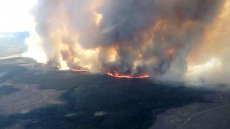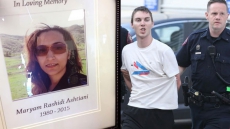OTTAWA — Newly released memos show Canada's spy agency revealed its interest in people to foreign partners in two cases after receiving assurances the individuals would not be tortured — a practice human rights advocates say shirks the law and puts vulnerable detainees at risk.
In one case, the Canadian Security Intelligence Service got the green light from a high-level internal committee to interview a Canadian detained abroad as long as captors gave "proper assurances" the person would not be abused, the CSIS documents say.
In another case, the spy service received the go-ahead to send information to an allied agency about a terrorist target of mutual interest if such "assurances" were provided, the internal CSIS memos reveal.
The two cases were among 10 instances in which the CSIS information sharing evaluation committee applied a ministerial directive on the use and sharing of information that may have been tainted by torture or could give rise to someone being brutalized in an overseas prison cell.
The Canadian Press used the Access to Information Act to obtain CSIS notes outlining the 10 cases — with names and other identifying details stripped out — as well as a spring 2014 memo to spy service director Michel Coulombe.
The two cases in which CSIS sought promises that individuals would not be abused raise "a red flag," said Alex Neve, secretary general of Amnesty International Canada, who called the practice an end-run around international legal obligations.
"That's always problematic from a human-rights perspective," he said in an interview.
"It's not reliable. And we have been deeply concerned about the ways in which governments around the world have been increasingly relying on assurances."
Many western governments have resorted to the use of "diplomatic assurances" to circumvent their obligations under international law, said Ottawa human-rights lawyer Paul Champ.
Courts and United Nations bodies have held — and, more tragically, experience has confirmed — that assurances are not adequate protection against torture and should not be used as an excuse for practices that might contribute to abuse, he said.
"Canada's own experience in Afghanistan amply demonstrated that repeated assurances from the Afghan government did not stop Canadian-transferred detainees from being tortured."
CSIS spokeswoman Tahera Mufti said the agency was "very cognizant" of its legal and ethical obligations in sharing information.
"We are very careful to ensure that everything we do to keep Canadians safe is consistent not just with Canadian law but Canadian values."
The federal policy on foreign information-sharing, ushered in by the Conservative government, has been roundly criticized by human-rights advocates and opposition politicians who say it effectively condones torture, contrary to international law and Canada's UN commitments.
A four-page 2010 framework document, previously released under the access law, says when there is a "substantial risk" that sending information to, or soliciting information from, a foreign agency would result in torture — and it is unclear whether the risk can be managed through assurances or other means — the matter should be referred to the responsible deputy minister or agency head.
In deciding what to do, the agency head will consider factors including the threat to Canada's national security and the nature and imminence of the threat; the status of Canada's relationship with — and the human rights record of — the foreign agency; and the rationale for believing that sharing the information would lead to torture.
In one of the 10 CSIS cases, just such a scenario emerged: a two-fold CSIS request to check with foreign agencies about a Canadian target and to interview a foreign national detained abroad with knowledge of the target was referred to the CSIS director for a final decision when the committee ruled the request could well lead to someone being tortured.
In the end, there was no need for the CSIS director to make the decision, as the information was acquired through other means with no perceived risk of mistreatment.
CSIS, the RCMP, the Canada Border Services Agency, National Defence and the Communications Security Establishment, Canada's electronic spy agency, are bound by the federal policy on sharing information with foreign agencies.
The newly released notes discuss formal risk assessments carried out by the Mounties in 2013-14 that led to rejection of all five requests from police investigators to send or receive information.
In one RCMP case, a request to interview a Canadian held in a foreign prison was denied due to the assessment that detainees face a risk of torture and other degrading abuse in order to extract confessions.





